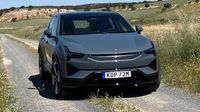Polestar, the Swedish electric-vehicle manufacturer, has paused its 2025 forecast amid uncertainty surrounding potential U.S. tariffs that could significantly impact supply chains and increase car prices. This announcement came on Wednesday, April 30, 2025, as the company navigates the complexities of shifting its manufacturing operations away from China to the United States and Europe.
CEO Michael Lohscheller expressed concern over the repercussions of American import duties, which are expected to hit the company hard. The automotive industry is currently facing a tumultuous landscape due to U.S. President Donald Trump’s rapidly shifting trade policies, which have imposed levies of at least 145% on vehicles imported from China. This has prompted several automakers, including Stellantis, General Motors, and Volvo Cars, to retract their forecasts and warn of potential revenue and profit declines.
In a bid to alleviate some of the industry’s burdens, Trump signed an executive order on April 29, 2025, aimed at softening the impact of his auto tariffs. This order combines credits with relief from other levies on parts and materials, a move that has been met with mixed reactions from industry stakeholders.
Despite the challenges posed by the tariffs, Polestar remains optimistic about its growth trajectory. The company anticipates compounded growth in vehicle sales between 30% and 35% over the next two years, alongside an expected improvement in gross margins through 2025. This optimistic outlook is bolstered by strategic discounts aimed at attracting disgruntled Tesla owners, which have successfully generated demand in the U.S. market, even as concerns about a potential recession loom due to the tariffs.
However, not all news is positive for Polestar. The company has filed a notice with the U.S. Securities and Exchange Commission to delay the publication of its 2024 annual report, now expected to be filed by May 14, 2025. This delay follows a series of setbacks for Polestar, including the postponement of its fourth-quarter results, which were initially slated for March but were pushed to April. Investors have expressed concern regarding the company’s accounting practices, especially after Polestar had to republish statements from previous financial years due to errors.
As Polestar prepares to release its first-quarter results in May, the company’s leadership faces increasing scrutiny over its financial disclosures and overall strategy in the face of mounting tariff pressures. The uncertainty surrounding U.S. tariffs on electric vehicles, particularly those assembled in Canada, adds another layer of complexity. Currently, every Canadian-assembled car shipped to the U.S. is subject to a 25% tariff on its non-U.S. content, a situation that will likely remain unchanged.
In summary, while Polestar is poised for growth in vehicle sales and has strategies in place to attract customers, the company must navigate a challenging regulatory environment and address investor concerns regarding its financial health. The decisions made in the coming weeks will be pivotal for Polestar as it seeks to solidify its position in the competitive electric vehicle market.




